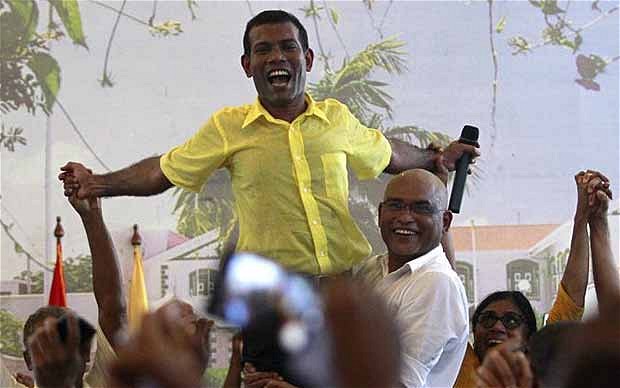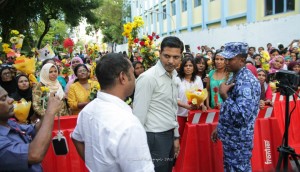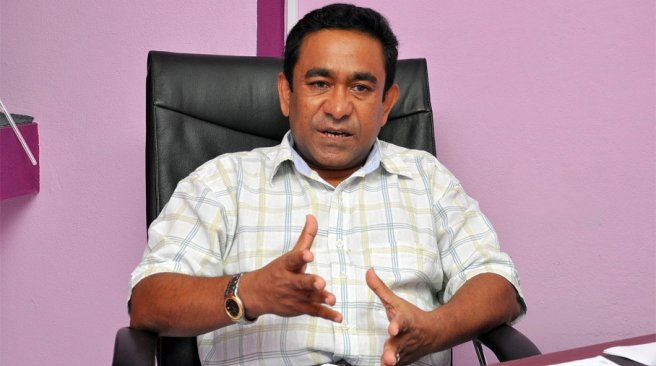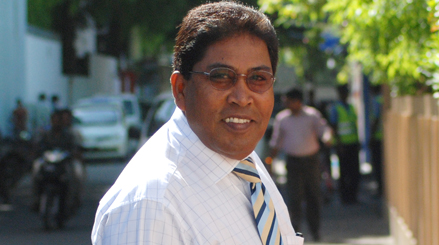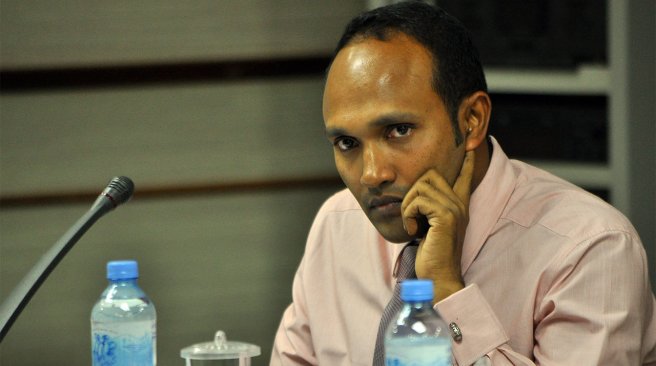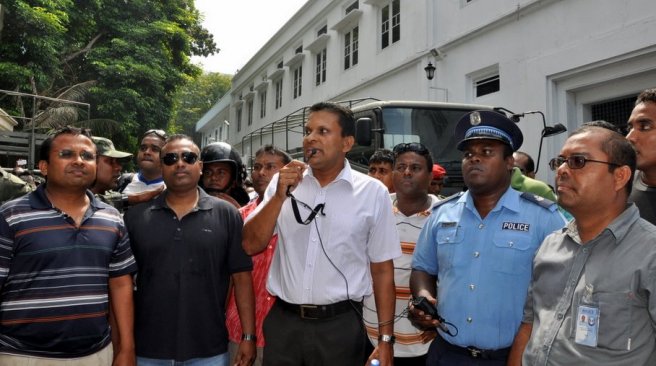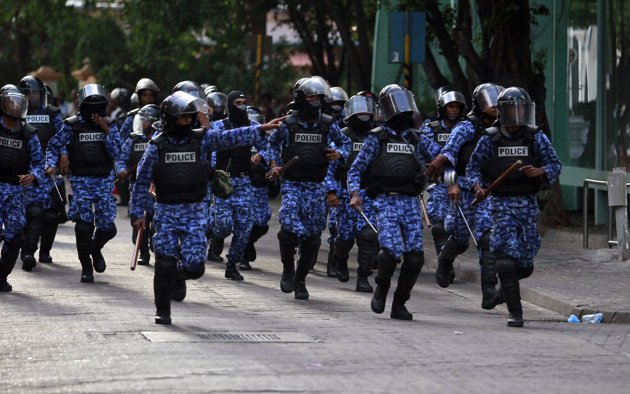The current Deputy Commissioner of Police Hussein Waheed gave testimony to the Commission of National Inquiry (CoNI) concerning the events 7 February 2012. At the time, he was an Assistant Commissioner of Police. This is a translation from the Dhivehi transcript of his testimony, focusing on the night of the 6th and the early hours of 7th February.
On 6th February, around 1:30 former Commissioner Faseeh summoned me.
“This is not a conversation I desire. But, given the responsibilities of my position, I have no choice but to tell you this,” the Commissioner said.
“Go on,” I replied.
“The President has ordered that you be asked to resign, the Home Minister tells me. So I am asking you to resign.”
The whole place went slightly silent for a moment.
“Why? What’s the reason”, I asked.
“I don’t know the reason”, CP said. “There isn’t one.”
“What if I don’t resign?” I asked after another moment of silence. “What then?”
“Nothing. Legally, nothing can happen to you. You are not in a political position. You are an Assistant Commissioner. Nothing can be done legally to force you to resign.”
“I have to think about this,” I said.
“There isn’t much time to think,” the Commissioner replied. “You have to make a quick decision.”
“Give me until Sunday,” I said.
It was a Thursday, from what I recall… a Monday, yes it was a Monday.
“You don’t have time to think,” the Commissioner said. “Besides, whatever you think, ultimately the answer will have to be yes.”
“It will be hard, working against the system. I am more swayed towards leaving than not. Anyway, I need a holiday. I’ll use the time to arrange my retirement and stuff,” I told the Commissioner.
I collected by cap — no, my glasses and keys — from my desk and went straight home. I spent sometime with my young one before my wife returned.
I told her about the conversation with the Commissioner.
“That’s where I am now. I have to make a decision.”
I rang my father a bit later, had a chat with him about it.
I thought. I have spent considerable time within the police and military. I knew my arrest was inevitable. Okay, the resignation request was polite, but when they say, “You must resign,” that means there’s going to be an allegation surfacing from somewhere to back up such an order. That’s why they were coming for me. They would arrest me. I wanted to spend sometime with my child.
I stayed in the same clothes as before. Any moment now, they would arrive. I knew. Somebody would come. Someone would have at least a question to ask of me.
Waiting, I nodded off. It was around 20:00 when I awoke. I phoned a friend, Shahdhy.
“I need to talk. Better if you come for me.” Shahdy could only make it around 22:00. I could wait. Time, I had a lot of it. When he came, we went to the Gallery [Cafe].
I had a coffee. Shahdhy ate. He had just been to the gym.
I talked about the order for me to resign, and the need to get a job. That’s the gist of it. At this point, retired Deputy Commissioner Rishwan called Shahdhy. I talked to him on Shahdhy’s phone and invited him to join us.
By then Shadhy had finished eating, and I had finished my coffee. Without quite knowing why, I felt uneasy. Really, ‘from inside’ I just didn’t feel that comfortable.
“Let’s go somewhere else,” I said, as soon as Rishwan came. “Let’s not have coffee here.”
We didn’t stay long. Only long enough for Rishwan to have a cigarette. Shahydh paid the bill, and we left. We went for a short spin, then to Trends. Upstairs was closed. We had wanted a secluded place. Shahdhy has good relations with the boys who work there. We got a table with a view upstairs.
Our conversation was about jobs. Rishwan made me some very good offers. It probably has to do with our relationship. They were great offers. A percentage share of his company, plus a job. We were deep in this discussion when a colleague, Shaz, phoned me.
“It’s on TV. A Facebook status update [by wife] about your resignation, being asked to resign’, Shaz said. “It’s a hit story.”
“It’s true,” I confirmed.
My other phone started ringing. More friends calling. I better switch them off, I thought. That was around 10:30. I can’t tell you the exact time. It was between 10:00 and 11:00 anyway. I switched both phones off. Somehow, my wife knew I was with Rishwan. She rang Rishwan whenever she wanted to talk to me.
We saw a large number of police lads running past Trends. They seemed to be shouting. As I was going up, I bumped into Akram Kamaluddin. I even shook hands with him. He’s a boss at my wife’s office. When I came down, they were still there, Akram and Saleem. I greeted them as I left.
It was around 11:oo, 12:00. Not that late. Police movements had ended by then, for sure. We rode along the road to the east of Henveiru Stadium, collected the wife from a house she was staying in, sat her behind Rishwan and went home. I took a lift with Shaydhy.
“Don’t come outside. Stay in tonight.” Rishwan warned me, as I lingering at the gate. Both my phones were off. I couldn’t phone anyone else.
I wasn’t long inside when I heard a crowd outside. They smashed our shop windows. I didn’t feel like calling the police, and asked my wife to do it. I told her which number to dial.
“Phone the Duty Officer. Report what has happened.”
She relayed the message. What happened afterwards, I don’t know, I didn’t check.
My aunty came to see me. So did my father. My Dhonma. My two other younger sisters. A brother. He spent sometime with me. We were all glued to the television. Raajje TV.
‘Hussein Waheed vandalised MDP Haruge and pepper-sprayed the people there.’ Raajje TV reported. I didn’t hear those exact words when I switched it on, but I heard about it being said. On the ticker was the news that ‘Commissioner Hussein Waheed has been fired.’ Or it said ‘retired’. I don’t know the exact word. I didn’t pay much attention. It’s not a channel I like watching anyway, I don’t pay much attention to it. I had to watch it on that night because of what I had heard that day.
When all the glass had been smashed and things had quietened down, it was around 2:30-3:00. I changed and went for another lie down.
From what I heard on television, things had gone very badly that day. Police had gone in to control a confrontation on Artificial Beach, withdrawn, been ordered away to the Republic Square, stayed there…these are all things I had heard.
I tried to sleep but failed. I stayed in bed, though, until about 7:00 or 8:00.
“President Nasheed is speaking to the police lads. The mood wasn’t good. ‘No sir,’ we heard them say,” a brother-in-law said to me.
I went in to watch TV. Even bigger events were unfolding. A confrontation between the police and the military.
***********
My father arrived at my house.
“You must go there,” he said.
“No. If I go there, I’ll be blamed even more. Some of the lads may be destroyed because of me. I won’t go there.” Right then, on TV, I saw weapons for rubber bullet pallet balls. I saw gassing.
I’ve been in the armed forces for a while, I’m familiar with how such situations process. I knew it would be live rounds next. I felt tears welling up.
“There will a bloodbath,” I said. “The two sides will attack each other, and nobody will be able to stop them. Things are at a critical stage. However much the police and the military continues to protest, the President won’t resign. He would not give up the job, the presidency. He would control the situation in any way he can, he has the authority.
“He will control it, but by then the bloodbath would have happened. This is very unhealthy. This shouldn’t happen.”
I began to cry. I couldn’t help it. My father consoled me. He stayed with me for a while, gave me encouragement. I just sat around at home then. Around 11:00 Rishwan called me on my wife’s phone. He wanted me to come to the police {HQ]. I asked why.
“You are being sought here. You must come,” Rishwan said.
“Is it wise for me to be there?” I asked.
“Judging from the current situation, I doubt things would get worse from now on. From what I know, there’s talk of the President stepping down”, he said.
Should I go, or should I stay? I mulled it over.
“I can’t go by myself. Send someone for me,” I decided. A vehicle was arranged. I shaved, splashed some water over me, changed, and waited. Soon three or four police lads were at my house. I went with them in their vehicle.
The scene you witness maybe of my hand being shaken as I walked in then. First I went to the Republic Square. There were some people — I don’t know who. They were police — on a vehicle. I am reluctant to name names because I don’t know for sure. I stayed long enough to have a look at what was happening, then went into the HQ.
There is a small sitting room beside the lift. There were people in the room, I noticed. I opened the door. I saw some members of the [National] Alliance. On seeing me, they offered me their hands to shake. I did that, then went upstairs.
I think I had a coffee in the mess room next, before going to the conference room downstairs. Some police officers, and again some members of the Alliance, were there. We had a discussion. That’s when I learnt the President had completely decided to resign.
Later, after the President resigned, things had calmed down, and the Alliance team had left, Fairoosh and I took leadership of the place. It was a policy decision — in order to enable the small and immediate changes necessary within the police and to maintain policy order. It was decided after discussing with the people present.
This is what can be seen and what can definitively be said about my involvement in the incident. The rest I know is information I have received from various people at various times from then till now. I can verify the authenticity of that secondary information. So I won’t talk about it.
 (0)Dislikes
(0)Dislikes (0)
(0)